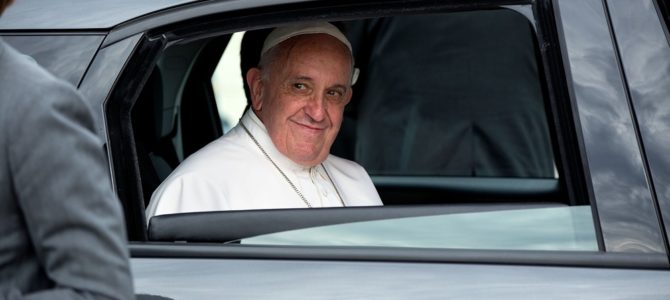
“A great many of our attitudes and principles which we adopt as Christian are nothing but products of our subjection to the world.”—Jacques Ellul, “False Presence of the Kingdom”
Nothing better reveals the moral compass of the current pontificate than its mania for smiling relations with a Leninist dictatorship. Pope Francis is not the first modern pope to wish for better relations with the People’s Republic of China. But he is the first to acquiesce in the regime’s goal of absolute dominion over religions, particularly the Catholic Church. His predecessors were more lucid. And more principled
The Vatican is poised to surrender control of the long-suffering Roman Catholic Church in mainland China to the Central Committee of the Communist Party (CPC). Short of full diplomatic recognition, the deal abandons Chinese faithful to their persecutors.
Validly ordained bishops are being asked to step down to make way for government-approved ones, including several who have been excommunicated. (Excommunication is the penalty for accepting ordination without papal approval.) Faithful priests already selected as valid successors to retiring bishops have been ordered to forego ordination to avoid offending the Chinese regime.
Far from making life easier for Chinese Catholics, this disheartens and oppresses them further. The reward for their heroic decades-long endurance is a garland of tears over betrayal by the papacy they honored at cost to themselves. No wonder Cardinal Joseph Zen, the Shanghai-born bishop emeritus of Hong Kong, calls it “a bad deal.” A lion of a man, and a persistent advocate for human rights and democratic liberties, Zen has been an obstacle to Vatican appeasement of Beijing.
What China’s Rulers Want, and Are Getting
On January 18, the cardinal posted an open letter on his blog—reposted by AsiaNews—warning against the consequence of accommodation: “The Communist government is making new, harsher regulations limiting religious freedom. They are now strictly enforcing regulations which, up to now, were practically only on paper. From the 1st of February, 2018, attendance to Mass in the underground will no longer be tolerated.”
Mass in the underground will no longer be tolerated. In other words, the emboldened regime need no longer keep up appearances for public relations. With the Vatican’s blessing, it can openly enforce prohibition of the valid Mass for which close to three generations of Chinese faithful have suffered.
Going forward, all bishops will be “democratically” selected by the government-led Council of Bishops, to which the Vatican has already ceded authority. Names will be sent to Rome for rubber stamping, a sellout that appears to have been in the works for some time.
In a significant but overlooked 2015 article in AsiaNews, editor Bernardo Cervellera explained Beijing’s bedrock position in “negotiations” with Vatican sympathizers. Then as now, any mention of imprisoned bishops was off the table. Then as now, Beijing’s proposal consisted exclusively on complete recognition by the Holy See for all Communist Party-approved bishops. Moreover: “The Holy See must approve the Council’s appointment and has a weak veto only in ‘severe’ cases, which must be justified if used. If the Holy See’s justifications are considered ‘insufficient,’ the Council of Bishops may decide to proceed anyway.”
Cervella continued: “The increased controls have only one purpose: to preserve the monopoly of power of the Communist Party of China (CPC) and remove or crush any person who might challenge it or its very existence.”
The Vatican has already quietly accepted certain Communist-appointed bishops. But even circumspection no longer applies. On January 29, AsiaNews quoted Zen again: “ Do I think that the Vatican is selling out the Catholic Church in China? Yes, definitely, if they go in the direction which is obvious from all what they are doing in recent years and months.”
‘Manipulate Catholics to Submit to the Communist Party’
Francis’ bow to Beijing is not an internal matter for Catholics only. The concession is a rag bag of geopolitical ramifications, an ominous move in a larger global power struggle in which the Chinese Catholics are so much collateral damage. The omelet matters more than broken eggs.
Judged solely by low Machiavellian standards of statesmanship, the capitulation is a political coup. But for whom? For China, thawed relations with the Vatican enhance its global image and deflect attention from its militarism, duplicity, and depravity regarding human rights. Plus, the regime earns a diplomatic victory over Taiwan. The Vatican can tout the close of a seven-decade breach between the underground “Church of the Catacombs,” loyal to the Holy See, and the Chinese Catholic Patriotic Association, a creature of Beijing.
The Patriotic Association, founded in 1957 as the CPC’s counter-church, is a nationalist stand-in for the ancient repository of thought and worship in communion with Rome. Twenty years ago, Matthias Lu, a noted translator of the church fathers, Aristotle, and Thomas Aquinas into Chinese, summarized its aims. They have not changed: “Its [the Association’s] commitment is to manipulate the mass of the Catholic population in order to integrate them into the Socialist revolutionary movement by submitting them to the leadership of the Communist Party in all things.”
Vatican press trumpets this pact with the devil as an historic halt to impending schism. The spin is worthy of the CPC’s Central Publicity Department. Pope Francis has merely flattered the regime by normalizing an existing schism dating from the 1950s when the Catholic Church was outlawed, its properties confiscated (later transferred to the Patriotic Association), and Catholics arrested en masse. The winning side in this new order belongs to Xi Jinping.
Communism Is Not Reconcilable with Christianity
In May, 2015, Xi Jinping spoke with the United Front, led by the Central Committee. He repeated what Communist Party leasers have affirmed since Mao denounced the Vatican as “the stray dog of capitalism.” In sum, he insisted on “Sinicization of religion,” including independence from “foreign influences,” as the only way the Catholic Church will be permitted to survive in China.
Xi’s Sinification is not the dialogue with Chinese culture (inculturation) that has characterized the church in China since the sixteenth century. Instead, it is a political power grab that reduces Christianity to an offshoot of socialist doctrine. Churches can continue to function as charitable organizations or non-governmental organizations, but the hierarchy become bureaucrats in the party apparatus.
Autonomy from Rome teems with implication for the Catholic Church’s social doctrines. The bureaucrats of collectivism have their own dogmas, infallibilities, and absolutes. These are in radical contradiction to traditional Christian reflection on morality, especially those relating to life issues.
Implicit in Francis’ conciliation is permission to ignore a range of moral matters that define a Christian conscience. The Catholic Church’s philosophical arguments defending the inviolable dignity of human life and the primacy of the individual cannot be asserted in pulpits. Silence is assured on labor camps, on the execution of prisoners to feed the lucrative organ trade, and on “family planning” policies. A comfortably Sinicized church can keep a good conscience while disregarding forced abortions, forced sterilizations, or forced migration (e.g., the massive Three Gorges Dam project unhoused 1.4 million peasants and submerged some 900 towns and villages).
In all, the Bergolian pontificate is set to achieve what the Communists have not: strangulating the Catholic Church as a living witness to the gospels and their demands.









